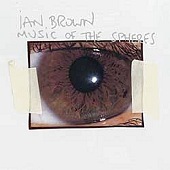Ian Brown
Music of The Spheres (Ian Brown)
By: Alex Routledge

 This is the Briton?s third solo effort and will surely serve to dispel further any doubts over his new musical direction. He flirts a bit more openly with commerciality on this offering and there?s certainly an abundance of fresh and exciting ideas bouncing around.
This is the Briton?s third solo effort and will surely serve to dispel further any doubts over his new musical direction. He flirts a bit more openly with commerciality on this offering and there?s certainly an abundance of fresh and exciting ideas bouncing around.Since the untimely demise of The Stone Roses, Ian Brown?s two solo albums have received mixed reviews. Sometimes flawed musicianship, high-ridden on former glories, was mixed with the odd genius touch and stand-out track. With contributions from widely acclaimed and talented figures, the only doubts lay over his own songwriting and vocal talents. First album, Unfinished Monkey Business was a brave but somehow disorientated attempt to recreate his past success whilst Golden Greats marked a new direction for him. In the eyes of most critics however, he is yet to either recreate or surpass his work with The Stone Roses.
Music of The Spheres starts with a surging and uplifting orchestral blast, not dissimilar to The Verve?s Bittersweet Symphony. It?s a classic intro and sets the scene admirably for the rest of the album. F.E.A.R is easily the best song on this album, psychedically molding chilled-out grooves to memorable melodies. The beat drops in, adjoined by the energising psychedelia of some impressive electric piano and acoustic guitar and Brown?s understated vocals. This first tune, like much of the album, builds and builds and is full of unexpected turns and dives. With some inspired touches, this will strike many as a more commercial version of Massive Attack or Portishead. The Gravy Train is very reminiscent of some of Tricky's work, a fine blend of intricate rhythms and post-millenial instrumentation. Through the echoes of Primal Scream, emerges one of the better tracks from the LP and Brown's uplifting lyrics "Cos we got all the time in the world/I know you're mine" are a breath of fresh air. From here, the album really starts to spring to life and take on meaning.
Northern Lights starts with a whirling and tranquil electric piano and wouldn't sound out of place on a Morcheeba album, with its low-down vibe and chilled-out melodies. It stands out from the album and has a very psychedelic, 70s lounge feel to it and its Aloof-style melodies are both soothing and uplifting. A memorable track, Northern Lights is likely to be remembered as one of the singer?s finer moments but would still cut it thin as single material.
After Northern Lights comes Whispers, the second single from the album. This striking tune, although perhaps unremarkable the first time round, bears to repeated listening, from the electronica-tinged intro to the funky chorus right through to the whirlpool of magnificent strings which emerge towards the end of the song. Whispers is unlike everything Brown has done before; a 70s soul theme pervading through much of the track, as rock and funk nuances sweep in and out of the mix. The strings faithfully recreate Curtis Mayfield in his heyday, as more modern ideas create a soulful sonic mirage. Whispers is full of highs and peaks and with an enviable groove and is undoubtedly the album?s high point.
Unfortunately, the uninspired moments on Music of The Spheres cloud an otherwise brave attempt at creating a spiritually moving album. Stardust's new experimentalism is let down by a poor arrangement and lifeless and dull-sounding vocals. Hear No See No, a lush and atmospheric instrumental, would probably fail to impress even Brown?s most hardcore fans whilst the album?s closer, Shadow of a Saint, is a lowly and ill-fated finale to a promising album.
Brown's attempt to produce the album independently, by avoiding commercial cliches and pitfalls, sometimes backfires on him also. His efforts to merge each track into the next one are ensnared at times by some pale, lacklustre songs, only redeemed by Dave McCracken?s fresh production ideas which create a beat-driven and funky backdrop for Brown?s awe-inspiring melodies. Music of The Spheres is a mixed blessing. It's an ambitious concoction of styles and influences, with great musicianship and production. Strong 70s elements and silky grooves compete with fresh and memorable melodies, amid the bravado of new sounds and experimentalism. The occasional mediocrities are overcome by unpredictability and sonic worth. In doing so, he creates a more commercial variant of dance/rock crossover bands such as Massive Attack and Morcheeba. What's more, potentially, with some strong singles, Brown could again find himself as a major British chart contender. As individual songs, this is easily the singer's best work for a decade although he is yet to make the 'classic' album he did with his former band. On listening to this, you realise why Brown has evoked an unmatched balance of success and credibility in his songs in recent years.
A clear progression from Golden Greats, Music of The Spheres takes Ian Brown to another level. This album remoulds him as the aloof and respected star he has always aspired to be and he should retain his position as a successful but fiercely independent solo artist. And we commend him.

